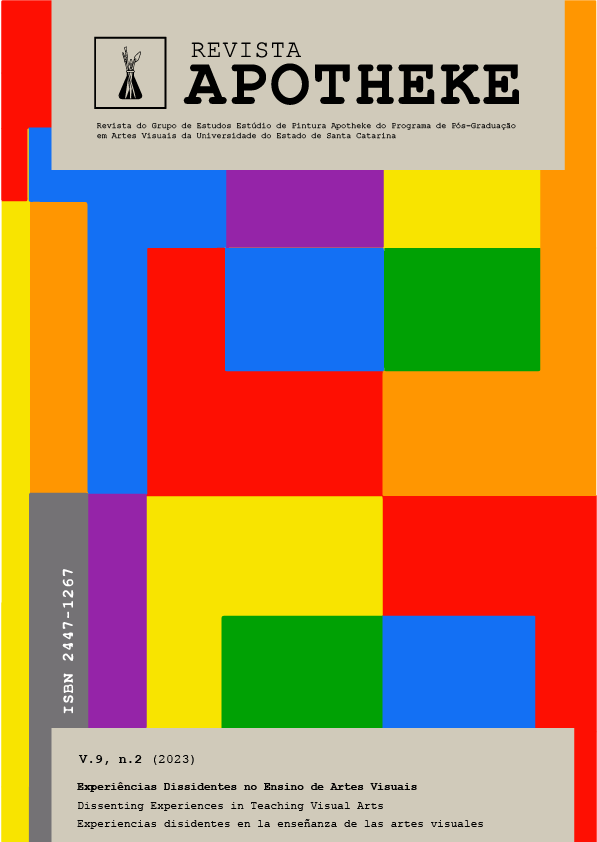Feminist analysis and visual essay from the Japanese animated series Yawara!
DOI:
https://doi.org/10.5965/24471267922023184Keywords:
manga, anime, television serial, gender issuesAbstract
Yawara! It is a manga created by Naoki Urasawa in 1985. This story marketed in comics tells the life story of Yawara, a high school student who, despite possessing great abilities and physical aptitudes to become an Olympic judo star, is torn between developing these potentialities or ignoring them to be included like any other young woman who follows the stereotyped and patriarchal canon of the society to which she belongs. In 1989 the plot was adapted into an anime television serial produced by Yomiuri TV and consisting of 124 episodes. Based on the plot of the television play, the first episode of the same is selected, to share in an artistic way through the research method based on the visual essay the feminist and anti-feminist messages that are transmitted to the consumer population of said resource. In this way, messages of empowerment are shared towards dissident women who break with gender issues linked to the development of professional sports careers, non-normative family structures and even ruptures of stereotyped behaviors with respect to normative and traditional genders. However, since the first episode of a series that evolves to totally feminist positions is analyzed, stereotyped messages related to the issue of romantic love are also extracted. These discourses must be made visible and critically reviewed. This is how an active and reflective consumption of the audiovisual product is attended.
Downloads
References
ABAD; PONT; ÁLVAREZ; GONZÁLVEZ; JOCILES; KONVALINKA; PICHARDO; RIVAS; ROMER. Diversidad familiar: apuntes desde la antropología social. Revista de Treball Social, Cataluña, vol. 198, pág. 30-40, Abr., 2013.
AGUILAR. Una aproximación teórica a las olas del feminismo: la cuarta ola. Femeris: Revista Multidisciplinar de Estudios de Género, Madrid, vol. 5, n. 1, pág. 121-146, En., 2020.
COLÁS; VILLACIERVOS. La interiorización de los estereotipos de género en jóvenes y adolescentes. Revista de Investigación Educativa, Murcia, vol. 25, n. 1, pág. 35-58, Jun., 2007.
HUERTA. La Memoria. Investigación Basada en las Artes para la formación del profesorado. Arte, Individuo y Sociedad, Madrid, vol. 34, n. 1, pág. 27-45, En., 2022.
MARTÍN. Contribución del feminismo de la diferencia sexual a los análisis de género en el deporte. Revista Internacional de Sociología, Madrid, vol. 64, n. 44, pág. 111-131, Ag., 2006.
MONLEÓN. “Princesitas” con diversidad funcional. Una aproximación crítica a la opresión de realeza femenina en la colección cinematográfica “Los clásicos” Walt Disney (1937-2016) y el contra-discurso creado por la obra artística de Alexsandro Palombo. ArtsEduca, Castellón, vol. 26, pág. 46-59, Mar., 2020a.
MONLEÓN. LGTBIQfobia audiovisual. La ocultación de colectivos sexualmente diversos en Disney. Revista Apotheke, Florianópolis, vol. 6, n. 3, pág. 86-104, Dic., 2020b.
MONLEÓN. Ensayo visual para ofrecer visibilidad al colectivo transexual. Revista Afluir, Jaén, vol. 1, n. 6, pág. 27-39, Oc., 2022.
PÉREZ. Metodología de análisis del personaje cinematográfico: Una propuesta desde la narrativa fílmica. Razón y Palabra, Quito, vol. 20, n. 95, pág. 534-552, Dic., 2016.
RAMÓN; ALONSO-SANZ. Cuerpos diversos, Tetas Diversas. Acción artística para sensibilidad en igualdad de género y diversidad sexual a través de la cerámica. Revista Apotheke, Florianópolis, vol. 6, n. 3, pág. 144-153, Dic., 2020.
ZURIAN. Héroes, machos o, simplemente, hombres: una mirada a la representación audiovisual de las (nuevas) masculinidades. SECUENCIAS, Madrid, vol. 34, n. 2, pág. 32-53, Dic., 2011
REFERENCIAS FILMOGRÁFICAS
Cinturón Negro (1989-1992), Dirección: TOKITA, Japón, 1989-1992.
Downloads
Published
How to Cite
Issue
Section
License
Copyright (c) 2023 Vicente Monleón

This work is licensed under a Creative Commons Attribution-NonCommercial 4.0 International License.
Copyright and Licensing Policy
Authors of works submitted to Revista APOTHEKE authorize their publication in both print and digital formats exclusively for academic purposes. Reproduction is permitted, provided that the source is properly cited. Authors confirm the originality, authorship, and unpublished status of their manuscripts.
Articles published by the journal are freely available and intended for academic and non-commercial use only. All copyrights are transferred to the journal. The content of signed articles reflects the views of their respective authors and not the official position of Revista Apotheke. The author(s) agree to always cite the following reference when republishing or referring to the content originally published in Revista Apotheke:
“This article was originally published by Revista Apotheke in volume (insert volume), number (insert number), year (insert year), and is available at: http://www.revistas.udesc.br/index.php/APOTHEKE/index”
It is the sole responsibility of the authors to obtain written permission for the use of any material protected by copyright law included in their articles. Revista Apotheke is not responsible for copyright infringements committed by contributors.
Authors retain copyright and grant the journal the right of first publication, with the work licensed under a Creative Commons Attribution-NonCommercial License (CC BY-NC):
-
Attribution (BY): Licensees are allowed to copy, distribute, display, perform, and create derivative works, provided that proper credit is given to the author or licensor, in the manner specified.
-
NonCommercial (NC): Licensees may use the material only for non-commercial purposes.
After publication, authors retain the rights to their work and may republish the text.



